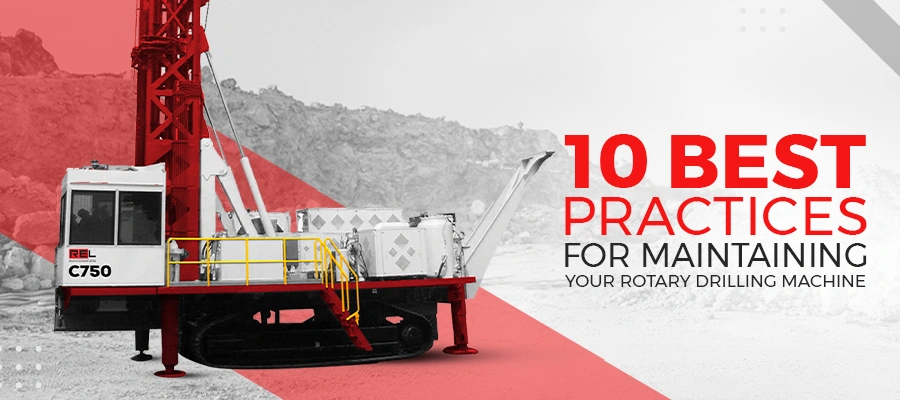10 Best Practices for Maintaining Your Rotary Drilling Machine
10 Best Practices for Maintaining Your Rotary Drilling Machine
Blog Article
 Maintaining your rotary drilling machine is an important part of ensuring that it continues to function as intended. This may include checking oil levels, tightening loose bolts, replacing worn or damaged parts, and replacing filters.
Maintaining your rotary drilling machine is an important part of ensuring that it continues to function as intended. This may include checking oil levels, tightening loose bolts, replacing worn or damaged parts, and replacing filters.
1. Regularly schedule maintenance and inspections
Establish a regular schedule for maintenance with your mining equipment manufacturer and inspections to ensure that all parts are in good working condition and to prevent equipment breakdowns. Keep detailed records of all maintenance and inspections performed on each piece of drilling equipment. This will help you keep track of when each task was last completed and will make it easier to identify any trends or issues.
2. Keep equipment clean
Regularly cleaning your heavy equipment can help to extend its lifespan by preventing corrosion and other types of damage.
3. Use the right lubricants
Using the correct lubricants for your equipment can help to extend the life of its moving parts and reduce the risk of breakdowns. Make sure to follow the manufacturer's recommendations for lubrication intervals and use the recommended lubricant.
4. Inspect and replace worn parts
Replacing worn parts is an important aspect of maintaining rotary equipment. Regularly inspecting equipment for worn parts, such as seals, bearings, bushings, filters and replacing them as needed can help to prevent breakdowns and prolong the life of the blast hole drilling rigs.
5. Maintain accurate records
By maintaining accurate records on rotary drilling equipment performance, operators can optimize drilling operations, improve equipment efficiency, and reduce the risk of costly downtime.
6. Train operators on proper use
Absolutely! Proper training of operators and the maintenance team on how to operate and maintain the equipment can help to ensure that they use it safely and correctly and can help to prolong the life of the heavy equipment. Provide ongoing training to ensure that operators stay up-to-date on changes to equipment, systems, and procedures. This may include refresher courses, training on new equipment or procedures, and regular safety training.
7. Filter Replacement
The filters in the rotary drilling equipment plays an important role in maintaining the quality of hydraulic fluids, lubricants, and air. Depending on the type of filter, you may need to unscrew it or use a tool to release it from the filter housing. You should regularly inspect and replace the filters as recommended by the manufacturer. This helps to keep the machine running smoothly and prevent contamination that can lead to component failure.
8. Monitor drilling parameters
Monitoring drilling parameters such as rotation torque, rotation pressure, feed pressure, air pressure, engine RPM and rotation speed can help to identify problems and issues before they become major problems. There are various tools and sensors that can be used to monitor these parameters in real-time during drilling operations. This information can be used to adjust the drilling process and ensure that the well is being drilled safely and efficiently.
9. Greasing
Proper greasing on defined points enriches the performance of the components and reduces wear and tear. After applying the grease, wipe off any excess grease using a clean cloth or rag. This will prevent the excess grease from attracting dirt and debris, which can cause the equipment to malfunction.
10. Overhaul
Overhaul is typically performed when equipment has been in service for a long time and has experienced wear and tear, damage, or other issues that may affect its performance and reliability. Overhaul can be a time-consuming and complex process, and it typically requires specialized knowledge and equipment. For this reason, it is often performed by experienced professionals or specialized repair facilities. Properly maintained and overhauled equipment can operate reliably and efficiently for many years, reducing the risk of downtime and expensive repairs. Report this page